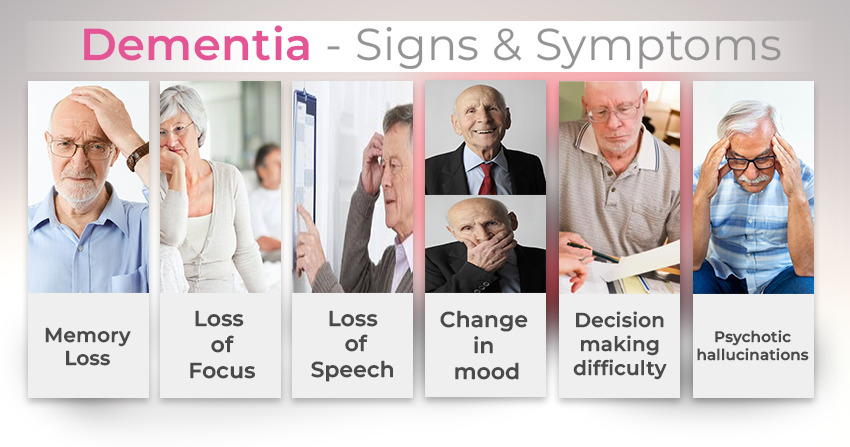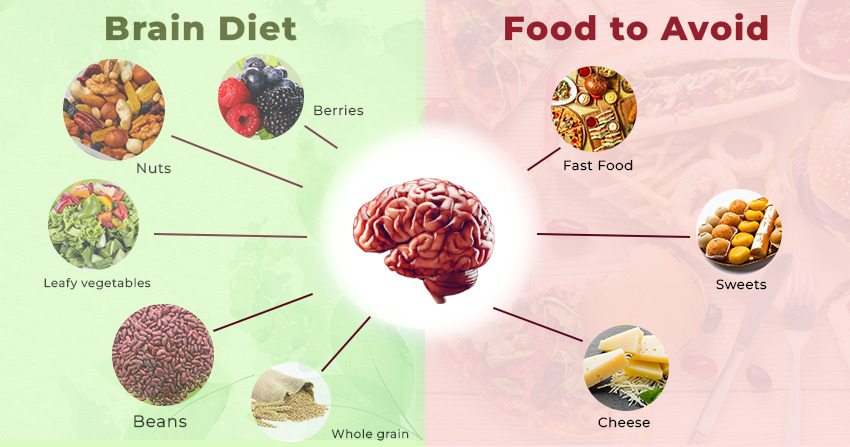Dementia
Oct 20, 2022
Dementia is not a singular disease associated with bad functioning of the body or the brain.
Dementia is a term that is given to a group of illnesses or symptoms that affect parts of the brain associated with memory, and other cognitive abilities such as thinking, learning, intelligence, problem-solving, perception, and language.
The symptoms are usually seen in people above the age of 65. It is, however, not related to aging
It is a condition associated with memory loss, lack of judgemental thinking, forgetfulness, limitation to social interaction, forgetting daily activities & functions, and forgetting family and friends
Alzheimer’s disease is a frequent and commonly seen type of Dementia.
What are the Early Signs and Symptoms of Dementia?

The most common symptoms of Dementia are behavioral and psychological symptoms and one such symptom is the loss of memory, but memory loss is usually accompanied by
Memory - Forgetting objects like keys and wallets, forgetting birthdays, forgetting people, getting lost
Attention - Difficulty in paying attention & focusing on work, losing interest
Communication - Difficulty in remembering words, repeating words, Less Social interactions
Behavioral - Change in mood or judgment, irritated, frustrated, restless, aggression
Cognitive - Difficulty in taking decisions or solving problems, analytical thinking, understanding
Psychological - Psychotic hallucinations, delusions, depression, anxiety, change in personality
At a later or more serious stage of Dementia, the symptoms get more serious and can completely affect a person’s ability to function alone with respect to social and personal skills. The person will require constant care.
These serious symptoms include:
- Cannot eat, bath, or do any activity by themselves and need help always
- Forgetting names of close family members, forgetting conversations, forgetting life incidents & memories
- Unpredictable behavior
- Involuntary Urination, defecation (incontinence)
- Limited or zero communication
- Bed-ridden (can never get out of bed)
Stages of Dementia
A person passes through 7 stages of Dementia gradually from the stage of no signs or symptoms to severe cognitive decline
|
No Dementia |
Stage 1 |
No Decline |
The Person seems normal, they do not show any signs or symptoms of dementia and such a problem will only be revealed when they take tests |
|
Pre-clinical |
Stage 2 |
Very Mild Cognitive Decline |
Slight changes in behavior, and normal forgetfulness which will be mistaken for aging by close family members |
|
Prodromal |
Stage 3 |
Mild Cognitive Decline |
Loss of taste appetite and sense of smell, memory loss, getting lost at places, speaking difficulty, Thinking & reasoning problems |
|
Early |
Stage 4 |
Moderate Cognitive Decline |
Lack of concentration, difficulty in traveling alone, difficulty in remembering or doing complex work, avoiding family and friends |
|
Middle |
Stage 5 |
Moderately Severe Cognitive Decline |
Require help & assistance for their daily activities, memory decline forgetting numbers, addresses, and the location they are in |
|
Stage 6 |
Severe Cognitive Decline |
Forgetting their close family members & friends, memories of recent and life incidents getting erased, psychological problems, incontinence |
|
|
Late |
Stage 7 |
Very Severe Cognitive Decline |
Do not communicate, cannot walk and stay in bed, and require help in everything. They go blank, do not eat, and require supervision always |
What are the main types of Dementia and their Causes?
In simple terms, Dementia is the slow and constant deterioration of the brain (damage to brain cells). The four common main types of dementia are:
Alzheimer’s disease
Alzheimer’s disease contributes to almost 40% of Dementia cases in India and is the major type. Its symptoms include
- Memory loss is associated with the inability to recall names or recent events/experiences
- Forgetting day-to-day tasks and things
- Difficulty in learning and communicating and overall denial of being forgetful
- These symptoms gradually become more prominent and affect other cognitive functions of the brain
Alzheimer's disease is caused by abnormal protein build-up in and around the brain.
The protein beta-amyloid forms plaque clumps and fibrous tangles in the brain (which majorly affects the hippocampus). This plaque and tangles of protein cause damage to healthy brain Neurons.
It can also be caused by mutation of genes hereditarily (apolipoprotein E4)
Vascular Dementia
Vascular Dementia is the second most common type of Dementia. It occurs due to the lack of blood flow to the brain. The patient may get multiple mini-strokes that affect the brain (visible in brain scans).
The arteries or the blood vessels that carry the blood to the brain are damaged or blocked. The symptoms are usually drastic and sudden, making them easily noticeable such as
- Visible confusion, aggressive behavior, and hallucinations
- Depressive behavior & erratic mood swings
- Loss of memory and difficulty in concentration & ability to perform tasks
- Vision impairment
- Physical paralysis & weakness of limbs
People with cholesterol, heart disease, strokes, high blood pressure, and smoking habits are at a higher risk of developing Vascular Dementia. It is also important to note that Vascular dementia and Alzheimer’s disease can affect a person together
Lewy Bodies Dementia
Lewy Bodies are proteins that get abnormally collected inside the nerve cells of the brain and that in turn affect the chemical messengers that control normal cognitive functioning. When this happens in the part of the brain called the Cortex it is called Lewy Bodies Dementia (LBD).
It is the third most common type. It accounts for 25-30% of Dementia cases but is not associated with genes or family history. Some of the common symptoms are Alzheimer’s and also include
- The constant change in attention levels
- Memory loss and disorientations
- Visual hallucinations & sleep issues
- Physical symptoms such as hands shaking, weak limbs, falling, and muscle stiffness
Parkinson's disease is a Lewy body disease that gradually causes Parkinson's disease dementia
Fronto Temporal Dementia
The cause of this disease is unknown, but it is said to be hereditary in the family. It is a rare type of dementia and affects the parts of the temporal and frontal lobes of the brain that control language and behavior. Some of the common symptoms include
- Changes in personality
- A rise in compulsive or disorganized behavior
- Thinking and memory problems
- Inability to act appropriately in social surroundings
- Speech and communication difficulties
One thing that differentiates this dementia from others is it can affect people who are as young as 45 years old.
Other known types of dementia are:
- Mixed dementia
- Parkinson’s disease
- Cruetzfeldt- Jakob disease
- Wernicke-Korsakoff disease
- Huntington's disease
- Traumatic brain injury
Other diseases such as MV, and HIV patients who don’t take their anti-virus and other medicines properly lead to fluid accumulation in the brain.
Prevention of Dementia
Although there is no visible treatment for Dementia. There are ways to deal with it if it has been diagnosed early. Before we dive into that, below are also certain causes that can be reversed and treated medically/surgically.
- Depression or Trauma causes a ‘pseudo-dementia’ like state which can be treated with anti-depressants and mental health therapy. Get enough sleep
- Alcoholism: Reactions due to alcohol or drug abuse behavior. Rehabilitation can help against the consumption of alcohol and smoking
- Nutritional deficiencies like vitamin B12 and folate deficiency can be treated with an increase in the intake of supplements that help reduce the deficiency
- Metabolic problems like Endocrine disorders such as thyroid hormone problems can also cause memory problems. This can be treated medically
- Medication side effects: Lead a healthy lifestyle if you take medications for cardiac or diabetes problems. Eat healthy food that can prevent these problems
Irreversible factors include age and family history
The Brain Diet

- Green leafy vegetables
- Nuts
- Beans
- Fish, Chicken & Eggs
- Spices
- Berries
- Whole Grains
- Omega-3 fatty acid foods - Olive Oil
Avoid Fried or fast foods, Sweets & Processed food, too much cheese, and butter
Early Tests, Dementia Treatment & Diagnosis
It is typically recommended to consult a psychiatrist, neurologist, or physician if there is a visible decline in memory recall and personality. A heightened awareness of the same is critical if the patient is above 50 years old. The patient will need to undergo several tests that are
- Cognitive, physical, and neurological in nature as part of the diagnosis process
- The Mental State Examination (MMSE) test is commonly used to screen for dementia
- Screening for abnormalities in the liver, kidney, thyroid, Vitamin B12, and folate
- CT scan or MRI is also done to rule out any degenerative changes in the brain
- FDG-PET scan
Lab Tests
- Thyroid hormone tests
- Vitamin B12 blood test
- Complete blood count (CBC)
- ALT or AST blood tests
- Glucose test
- HIV test
- Erythrocyte sedimentation rate blood test
- Genetic Tests
Most of the diagnosis is clinical in nature and takes no longer than 10 minutes.
If the person is said to have dementia that cannot be medically or surgically treated, the steps to take are more psychological and cognitive in nature. It involves mentally preparing for the changes that are going to come not only in the patient’s behavior or physical state but also with respect to how immediate the patient's family is ready and prepares for the same.
It is a progressive disease hence all concerned members of the family and patient need to be aware of the stages of deterioration and be fully equipped to handle what comes next.
- Creating a safe environment for the patient by removing items such as rugs, carpets, and clutter that can minimize falling
- Providing easy access to the bathroom, bedroom, and other areas in the house
- Keeping essential items within arm’s reach or visibility
- Ensuring that the patient is often included in all activities
- It is also crucial to treat them with utmost care and affection, not as though there is something abnormal with them but rather to empower them with love and inclusiveness
- Keeping them mentally engaged for a few minutes or hours a day can also help strengthen their cognitive abilities and memory. This can be done by creating a book of memories with their loved ones, key experiences, and achievements from their life, playing card games, going to therapy to address and resolve anxiety/hallucination, and just listening to the patient talk
These measures will leave the patient feeling motivated, happy, and generally positive in their outlook on life and well-being.
Conclusion
In conclusion, Dementia is a life-altering disease that can become frustrating and tiring not only for the patient but for those around them as well. But the reality is that there are about 47.5 million people who live with this disease and this number is expected to increase by 3X by 2050.
There are no defined methods on how to prevent dementia but with all the information around the causes and generally, on how to maintain a healthy life, the following have been said to reduce the risk of Dementia:
• Proper lifestyle
• Proper diet, rich in nutrients and Vitamins
• Mental activities like reading, solving puzzles, Sudoku, etc.
• Regular physical exercises
• Getting good sleep
So, along with the above, keep a cautious eye out for the symptoms. Because with early diagnosis and the right preparations, one can adapt their life to find joy even in the state of constant deterioration and ensure that their loved ones live life to the fullest capacity possible.
Recent Post

Why Should You Book Lab Tests Online?
_(1)_CAT_1640504567.jpg)
ஸ்மார்ட் போன்களால் ஏற்படும் பிரச்சனைகள்

Type 2 Diabetes Mellitus

Type 1 Diabetes Mellitus
_CAT_1684759383.jpg)
Tooth Cavities

Summer Skincare Routines and Sunscreen Recommendations

நமது வாழ்க்கையில் இன்சுலினின் பங்கு

Raising Happy and Healthy Kids!!!

Order Medicine Online in Chennai at Your Fingertips

Online Pharmacy in Chennai

